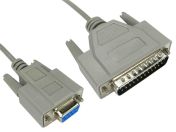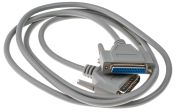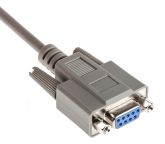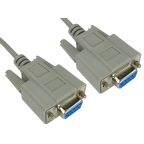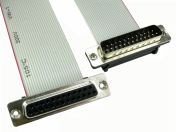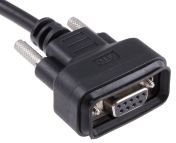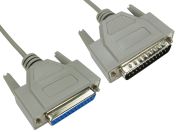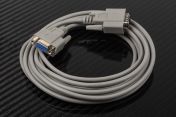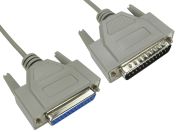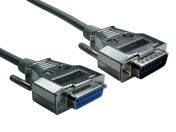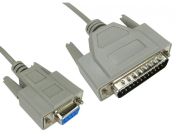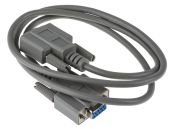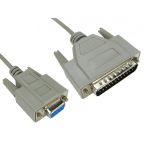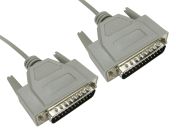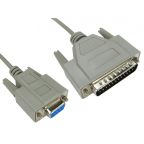Serial Cables
Serial cables are specialised computer cables designed for data transfer and communication between devices. Utilising serial communication protocols — where data is sent one bit at a time — serial cables facilitate effective, controlled information transfer. Many serial cable assemblies utilise the RS-232 (Recommended Standard 232) interface specifications, a widely recognised standard for serial communication.
What Are Serial Cables Used for?
Although technologies such as Ethernet, USB, and wireless connections have replaced serial cables in many settings, these cables remain essential in certain applications. Serial cable assemblies are commonly used to connect computers to printers, link Programmable Logic Controllers (PLCs) to Human-Machine Interfaces (HMIs), and interface with input and output modules, motor drives, and other devices. With the help of adapters, it is still possible for devices to communicate with each other using old and new standards.
Industry-specific examples include:
- Industrial Automation Systems: Ensuring reliable connections between machinery and control systems.
- Scientific Instruments: Facilitating data collection and analysis.
- Point of Sale Technologies: Connecting terminals with peripherals like receipt printers.
- Consumer Electronics: Enabling communication between various devices.
- Industrial Circuit Boards: Supporting inter-device communication in complex systems.
Different Types of Serial Cables
Serial cables come in various types, each designed to meet specific communication needs and standards. Understanding these types can help you select the right data cable for your application. Here are some of the most common types of serial interface cables:
RS232 Serial Cables
RS232 serial cables are among the most commonly used for serial communication. They typically feature D-sub connectors, such as DB9 (9-pin serial cable) or DB25 (25-pin serial cable), and are used to connect devices like computers, printers, and modems. RS232 cables support distances of up to 15 meters and can transmit data at speeds ranging from 300 bps to 115200 bps, depending on the cable quality and device capabilities.
USB Serial Cables
USB serial cables bridge the gap between traditional serial communication and modern USB connectivity. These cables allow devices that lack a dedicated serial port to communicate with RS232 devices. They typically include a USB connector on one end and a D-sub or other serial connector on the other end, making them versatile for various applications.
D-Sub Serial Cables
D-sub serial cables utilise durable connectors that come in various configurations, such as DB9, DB15, and DB25. Each configuration serves different purposes based on pin count and application requirements. For example, DB9 connectors are often used in personal computers and peripherals, while DB25 connectors may be found in older systems or specialised equipment.
Null Modem Cables
Null modem cables are a type of RS232 serial cable designed to connect two devices directly without a modem. They cross the transmit and receive lines, allowing two computers or terminals to communicate with each other directly. Null modem cables are commonly used in data transfer between two PCs or for debugging purposes.
V.35 Crossover Cables
V.35 crossover cables are designed for high-speed data transfer and are typically used in telecommunications applications. These cables allow for direct connections between devices that support V.35 interfaces, ensuring reliable communication at high data rates.
RJ45 Serial Cables
RJ45 serial cables are often used in networking applications but can also serve as serial communication links when configured correctly. These cables feature an 8-position modular jack and are compatible with many networking devices like routers and switches.
Serial Printer Cables
Serial interface printer cables are specifically designed to connect computers to printers that have serial ports. These cables ensure seamless data transfer for printing tasks, making them essential for environments where legacy printers are still in use.
Benefits of Serial Cables
Serial cables offer several advantages that make them a preferred choice for specific applications, especially in environments where reliable communication is essential. Here are some key benefits:
- Simplicity and Reliability: Serial communication transmits data one bit at a time, which simplifies the design of communication protocols and reduces the chances of data collision. This makes serial cables highly reliable for point-to-point connections.
- Long Distance Communication: Serial cables can transmit data over longer distances compared to parallel cables. For instance, RS-485 can support distances up to 1,200 meters, making it ideal for industrial applications where devices are spread out.
- Lower Cost: Serial cables typically require fewer wires than parallel connections, which can lead to lower manufacturing and installation costs. This is particularly beneficial in large-scale installations.
- Reduced Electromagnetic Interference (EMI): Differential signalling used in many serial protocols (like RS-422 and RS-485) help reduce the effects of EMI, ensuring cleaner signal transmission even in noisy environments.
- Flexibility in Configuration: Serial cables can easily be adapted to different types of devices using various connectors (e.g., DB9, DB25, RJ45), allowing for versatile applications across different industries.
- Ease of Troubleshooting: The straightforward nature of serial communication makes it easier to diagnose and troubleshoot issues compared to more complex parallel systems.
How to Choose the Right Serial Cables
Selecting the right serial cable involves considering several important factors to ensure compatibility and optimal performance for your specific application:
- Identify the Communication Protocol: Determine which serial protocol you need (e.g., RS-232, RS-422, RS-485). Each protocol has its own specifications regarding distance, speed, and connection type.
- Consider Cable Length: Assess the distance between devices. Longer distances may require specific types of serial cables (like RS-485) that can maintain signal integrity over greater lengths.
- Check Data Transmission Speed: Evaluate the required baud rate for your application. Ensure that the selected serial cable supports the necessary speed for efficient data transfer.
- Connector Type: Identify the type of connectors needed (e.g., DB9, DB25, RJ45). Ensure that both ends of the serial data cable have compatible connectors with your devices.
- Environmental Conditions: Consider the operating environment. If the cable will be exposed to extreme temperatures or electromagnetic interference, opt for shielded serial cables or ruggedised cables designed for harsh conditions.
- Number of Ports: Determine how many devices you need to connect through a single cable or adapter. Some USB-to-serial converters offer multiple ports if you need to connect several devices simultaneously.
- Isolation Requirements: If operating in electrically noisy environments, consider using isolated serial cables or converters to protect against surges and spikes that could damage equipment.
- Compatibility with Existing Systems: Ensure that the chosen serial cable is compatible with your existing hardware and software systems. Check if drivers are needed for USB-to-serial converters.
- Budget Considerations: Evaluate your budget while balancing quality and performance requirements. Sometimes investing in higher-quality serial cables can save costs related to maintenance and downtime in the long run.
Industry Applications of Serial Cables
Serial cables play a critical role in various industries, enabling reliable data transfer and system compatibility:
- Discrete Manufacturing: Used in assembly lines to ensure precise machine-to-machine communication.
- Process Manufacturing: Supports seamless data flow in chemical, food, and pharmaceutical production lines.
- Energy & Utilities: Provides connectivity for monitoring and managing energy distribution systems.
- Facilities & Intralogistics: Essential for warehouse automation, ensuring efficient logistics and inventory tracking.
Delivery Information
As a trusted supplier and distributor, RS offers a wide selection of serial cables, including options from brands like Phoenix Contact, SICK, and RS PRO. With fast and secure online ordering, RS makes sourcing other related accessories like USB cables and wire sleeves easy. For customer convenience, we offer next-working-day delivery within Singapore for online orders (Terms & Conditions apply). Please refer to our Delivery page for more details on delivery services and fees.
Popular Searches
Related links
- StarTech.com RS232 D Sub 9 Pin Male to USB A Male Converter Cable
- Brainboxes RS232 USB B Female to D-sub, 9 Pin Male Interface Converter
- Brainboxes RS232 USB C D-sub, 9 Pin Male Converter Cable
- Brainboxes RS232 USB A Female to D-sub, 9 Pin Male Interface Converter
- Digitus RS232 USB C Male to D-sub, 9 Pin Male USB Serial Cable Adapter
- Connective Peripherals RS232 USB B D-sub, 9 Pin Male Converter Cable
- FTDI Chip RS232 USB A D-sub, 9 Pin Male Converter Cable
- FTDI Chip RS232 USB A Female to D-sub, 9 Pin Male Converter Cable
